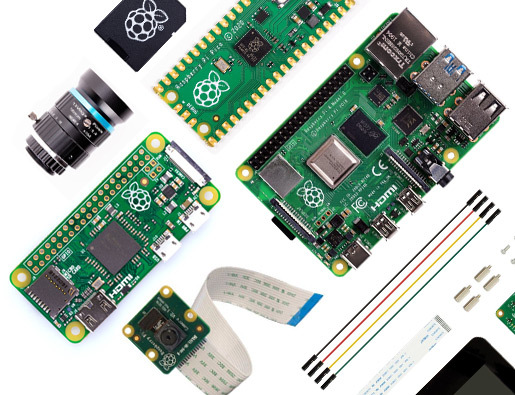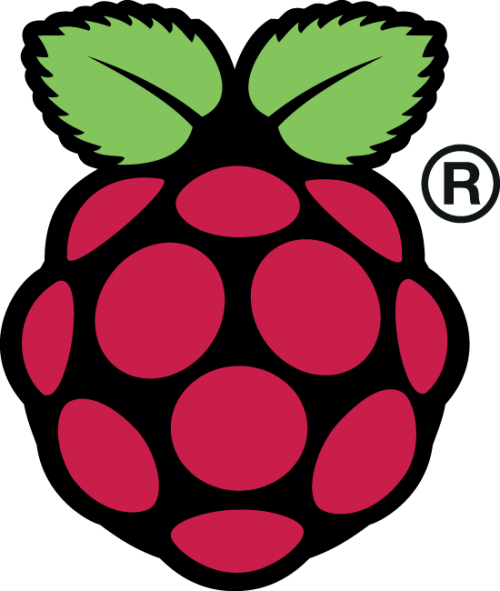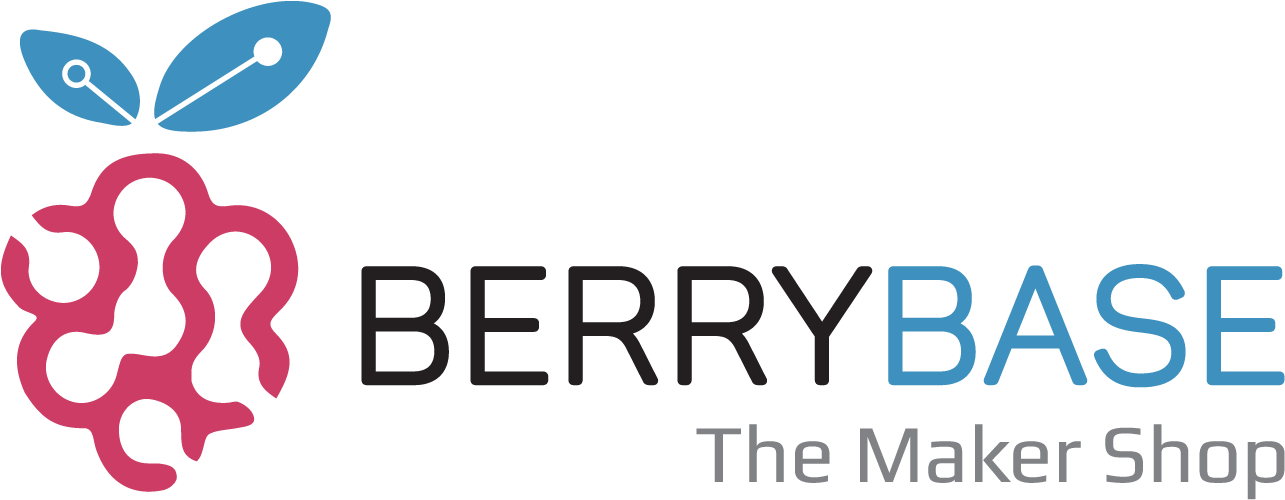The Raspberry Pi Foundation has laid the foundation for an incredible success with the Raspberry Pi 1 since 2012. The single-board computers have led to a revival of programming and experimentation in the younger generation. The low entry price and low entry threshold of programming skills have created a market for raspberry Pi Foundation products, which is shown here. Whether Pi Zero, Pi 4 8GB or Hi Quality Camera, there are the right products for your projects.
Raspberry Pi Foundation


No results were found for the filter!
Das Raspberry Pi 27W USB-C-Netzteil ist ein ideales Netzteil für den Raspberry Pi 5, insbesondere für Benutzer, die Peripheriegeräte mit hoher Leistung wie Festplatten und SSDs über die vier USB-Anschlüsse des Raspberry Pi 5 betreiben möchten.
Dank zusätzlicher integrierter Stromprofile ist das Raspberry Pi 27W USB-C-Netzteil auch eine hervorragende Option für die Stromversorgung von PD-kompatiblen Produkten von Drittanbietern. Die verfügbaren Profile sind 9V, 3A; 12V, 2.25A; und 15V, 1.8A, alle begrenzt auf ein Maximum von 27W.
Dank zusätzlicher integrierter Stromprofile ist das Raspberry Pi 27W USB-C-Netzteil auch eine hervorragende Option für die Stromversorgung von PD-kompatiblen Produkten von Drittanbietern. Die verfügbaren Profile sind 9V, 3A; 12V, 2.25A; und 15V, 1.8A, alle begrenzt auf ein Maximum von 27W.
Article no.: RPI5NT5AW
Das offizielle Netzteil für den Raspberry Pi 4, zugelassen von der Raspberry Pi Foundation (PSU), bietet mit seinem USB-Typ-C-Stecker eine zuverlässige Stromversorgung. Es ist speziell für den Raspberry Pi 4 konzipiert und bietet Schutz vor Kurzschluss, Überlastung und Überspannung. Die doppelte Isolierung nach Klasse II und der hohe ERP-Wirkungsgrad der Stufe 6 gewährleisten Sicherheit und Energieeffizienz.
Article no.: RPI4NT3AB
Article no.: RPI5-4GB
Der Raspberry Pi Zero 2 W ist der langersehnte Nachfolger des beliebten Raspberry Zero W – mit vielen Upgrades, aber im gleichen Formfaktor!
Er verfügt über eine Quad-Core 64-Bit Arm Cortex-A53 CPU, die mit 1GHz getaktet ist. Das Herzstück des Boards bildet ein Raspberry Pi RP3A0 System-in-Package (SiP), das einen Broadcom BCM2710A1 Chip mit 512 MB LPDDR2 SDRAM integriert. Der aktualisierte Prozessor versorgt den Pi mit 40 % mehr Single-Thread-Leistung und fünfmal mehr Multi-Thread-Leistung als der ursprüngliche Single-Core-Raspberry Pi Zero.
Er verfügt über eine Quad-Core 64-Bit Arm Cortex-A53 CPU, die mit 1GHz getaktet ist. Das Herzstück des Boards bildet ein Raspberry Pi RP3A0 System-in-Package (SiP), das einen Broadcom BCM2710A1 Chip mit 512 MB LPDDR2 SDRAM integriert. Der aktualisierte Prozessor versorgt den Pi mit 40 % mehr Single-Thread-Leistung und fünfmal mehr Multi-Thread-Leistung als der ursprüngliche Single-Core-Raspberry Pi Zero.
Article no.: RPIZ-2W
Article no.: RPI5-ACOOL
Article no.: RPI-PICO
Das offizielle Netzteil für den Raspberry Pi 4, zugelassen von der Raspberry Pi Foundation (PSU), bietet mit seinem USB-Typ-C-Stecker eine zuverlässige Stromversorgung. Es ist speziell für den Raspberry Pi 4 konzipiert und bietet Schutz vor Kurzschluss, Überlastung und Überspannung. Die doppelte Isolierung nach Klasse II und der hohe ERP-Wirkungsgrad der Stufe 6 gewährleisten Sicherheit und Energieeffizienz.
Article no.: RPI4NT3AW
Article no.: RPI-PICO-W
Raspberry Pi 4 Model B ist ein Mitglied der beliebten Raspberry Pi Computerfamilie. Im Vergleich zur Vorgängergeneration Raspberry Pi 3 Model B+ bietet es bahnbrechende Steigerungen bei Prozessorgeschwindigkeit, Multimedia-Performance, Speicher und Konnektivität, während die Abwärtskompatibilität und der ähnliche Stromverbrauch erhalten bleiben. Für den Endanwender bietet Raspberry Pi 4 Model B eine Desktop-Leistung, die mit x86-PC-Systemen der Einstiegsklasse vergleichbar ist.
Article no.: RPI4B-8GB
Das Raspberry Pi 27W USB-C-Netzteil ist ein ideales Netzteil für den Raspberry Pi 5, insbesondere für Benutzer, die Peripheriegeräte mit hoher Leistung wie Festplatten und SSDs über die vier USB-Anschlüsse des Raspberry Pi 5 betreiben möchten. Dank zusätzlicher integrierter Stromprofile ist das Raspberry Pi 27W USB-C-Netzteil auch eine hervorragende Option für die Stromversorgung von PD-kompatiblen Produkten von Drittanbietern. Die verfügbaren Profile sind 9V, 3A; 12V, 2.25A; und 15V, 1.8A, alle begrenzt auf ein Maximum von 27W.
Article no.: RPI5NT5AB
Article no.: RPI5-8GB
Article no.: RPIMNT25W
Raspberry Pi 4 Model B ist ein Mitglied der beliebten Raspberry Pi Computerfamilie. Im Vergleich zur Vorgängergeneration Raspberry Pi 3 Model B+ bietet es bahnbrechende Steigerungen bei Prozessorgeschwindigkeit, Multimedia-Performance, Speicher und Konnektivität, während die Abwärtskompatibilität und der ähnliche Stromverbrauch erhalten bleiben. Für den Endanwender bietet Raspberry Pi 4 Model B eine Desktop-Leistung, die mit x86-PC-Systemen der Einstiegsklasse vergleichbar ist.
Article no.: RPI4B-4GB
Article no.: RPI4-CASE-RE
Article no.: RPIZ-OCASE
Article no.: RPI4-HDMI2
Article no.: RPI5-CASE-BL
Article no.: RPIZ-W
Article no.: RPI-CC-SM-30
Article no.: RPI3-BP
Article no.: RPI-RTCBAT
Article no.: RPIZ-FLEX-038
Article no.: RPI5-CASE-RE
SALE
- Broadcom BCM2711 quad-core Cortex-A72 (ARM v8) 64-bit SoC @ 1.5GHz
- H.265 (HEVC) (bis 4Kp60 decode), H.264 (up to 1080p60 decode, 1080p30 encode)
- OpenGL ES 3.0 Grafik
- 8GB LPDDR4-3200 SDRAM
- 8GB eMMC Flash-Speicher
- kein WLAN und Bluetooth
- H.265 (HEVC) (bis 4Kp60 decode), H.264 (up to 1080p60 decode, 1080p30 encode)
- OpenGL ES 3.0 Grafik
- 8GB LPDDR4-3200 SDRAM
- 8GB eMMC Flash-Speicher
- kein WLAN und Bluetooth
Article no.: CM4008008
Das Raspberry Pi Camera Module 3 ist eine kompakte Kamera von Raspberry Pi. Sie bietet einen IMX708 12-Megapixel-Sensor mit HDR und verfügt über einen Autofokus mit Phasenerkennung. Das Kameramodul 3 ist in einer Standard- und einer Weitwinkelvariante erhältlich, die beide mit oder ohne Infrarotsperrfilter erhältlich sind.
Article no.: RPI-CAM3-WN
Raspberry Pi 4 Model B ist ein Mitglied der beliebten Raspberry Pi Computerfamilie. Im Vergleich zur Vorgängergeneration Raspberry Pi 3 Model B+ bietet es bahnbrechende Steigerungen bei Prozessorgeschwindigkeit, Multimedia-Performance, Speicher und Konnektivität, während die Abwärtskompatibilität und der ähnliche Stromverbrauch erhalten bleiben. Für den Endanwender bietet Raspberry Pi 4 Model B eine Desktop-Leistung, die mit x86-PC-Systemen der Einstiegsklasse vergleichbar ist.
Article no.: RPI4B-2GB
Article no.: RPI-CC-SM-20
Article no.: RPI-DC-SM-50
SALE
Ausgestattet mit einem Quad-Core 64-Bit-Prozessor, WLAN, Dual-Display Ausgabe und 4K-Videowiedergabe ist der Raspberry Pi 400 ein vollständiger Computer, eingebaut in eine kompakte Tastatur.
Tastaturlayout: QWERTZ, DE Layout, 79 Tasten
Tastaturlayout: QWERTZ, DE Layout, 79 Tasten
Article no.: RPI400-DE
Das Raspberry Pi Camera Module 3 ist eine kompakte Kamera von Raspberry Pi. Sie bietet einen IMX708 12-Megapixel-Sensor mit HDR und verfügt über einen Autofokus mit Phasenerkennung. Das Kameramodul 3 ist in einer Standard- und einer Weitwinkelvariante erhältlich, die beide mit oder ohne Infrarotsperrfilter erhältlich sind.
Article no.: RPI-CAM3-NO
Article no.: 125189
Article no.: RPI-DC-SM-20
Article no.: CM4008032
Article no.: RPI4-CASE-BL
Raspberry Pi Pico WH ist ein Mikrocontroller-Board, das auf dem Raspberry Pi RP2040 Mikrocontroller-Chip basiert.
Der Raspberry Pi Pico W wurde als kostengünstige und dennoch flexible Entwicklungsplattform für den RP2040 mit einer drahtlosen 2,4-GHz-Schnittstelle entwickelt.
Diese Version kommt mit bestückten Stiftleisten (H = Header) sowie einem 3-Pin JTAG Anschluss.
Der Raspberry Pi Pico W wurde als kostengünstige und dennoch flexible Entwicklungsplattform für den RP2040 mit einer drahtlosen 2,4-GHz-Schnittstelle entwickelt.
Diese Version kommt mit bestückten Stiftleisten (H = Header) sowie einem 3-Pin JTAG Anschluss.
Article no.: RPI-PICO-WH
Der Raspberry Pi 3 Model B sieht auf den ersten Blick wie der Pi 2 B aus. Es hat die gleiche Größe und viele der gleichen Komponenten an Bord. Was liegt also der Unterschied? Der neue Pi 3 bietet mehr Prozessorleistung und Konnektivität auf der Platine und spart so Zeit bei der Entwicklung Ihrer Anwendungen. Perfekt für Ihre Designs mit dem Internet of Things (IoT).
Article no.: RPI3B
Viewed
















































